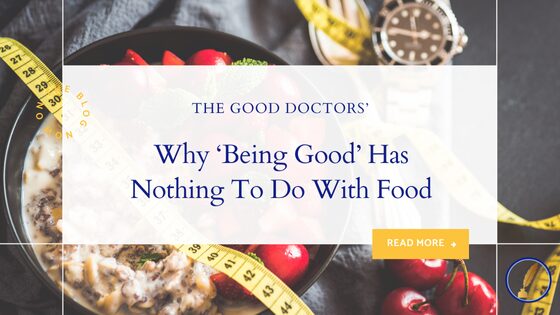
Hey folks – it’s Kristen here to talk about why ‘being good’ has nothing to do with food. And why this is a particularly important message now.
Food, Morality, and the Holidays
A huge part of any holiday is the food served at it and around it. There are emotions attached to specific dishes. Memories tied up with smells. And the ritual belonging that is formed when people eat together.
It’s also a time when people cannot stop talking about dieting. Or using the phrase ‘I’ll be good after the holidays’ or ‘I’ll cheat here’.
Here’s the thing, though: food has no moral value. You cannot be good or bad by eating certain foods. Thinking that eating cookies at Christmas is ‘cheating’ is a part of the systemic diet culture we all live in.
The culture we live in deeply believes that being skinny makes you a better person. The culture spends a lot of time reinforcing that. From the way bodies are talked about in general, to the weight loss medicines that grab headlines. It’s diet culture, and it’s insidious, and it’s painful, and it’s nonsense.
The Truth About Sugar
Unless your body is your job (athletes, mostly, but some others), food is food. You cannot cheat when you consume food your body wants, craves, and runs on. Sugar is not poison, carbs will not kill you, and cleanses don’t do anything – we promise. Don’t believe us? Here are a lot of scientists who agree: “Sugar is Not Toxic”, “Low Carb Diets Aren’t Safe”,“Is Detoxing Good for You?”.
The foods you eat are part of the life of balance we encourage. Our diets shouldn’t consist of all sugar, or all carbs, and do need to have vegetables. If they are mostly sugar, that doesn’t mean we’re a bad person. Though, and the word ‘cheat’ implies that we believe that. You can’t cheat when you’re seeking balance – you can only make informed choices about what’s best that day, and then make more tomorrow.
(Also, not for nothing, we’re learning so much more about eating disorders and it’s highly likely that someone you’ll dine with this holiday season is dealing with disordered eating. It’s not kind to constantly draw attention to your body or your eating habits when it’s simply not necessary to do so.)
So, this holiday season, we encourage you to be grateful for the food you’re given, remember that eating it or not doesn’t make you a good or bad person, and that food is never the enemy – diet culture is.
To learn more about how diet culture connects to burnout, check out our book HERE.


